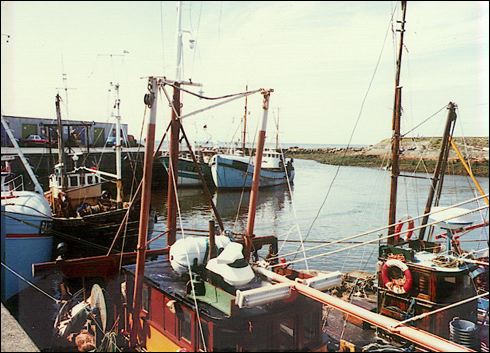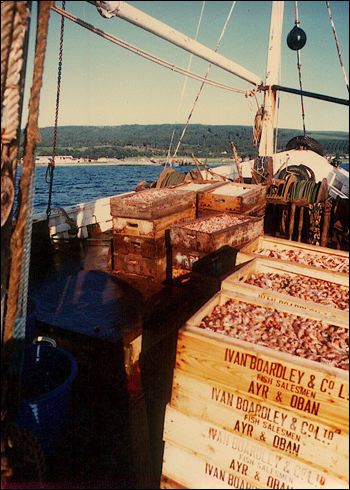 |
| Prawn trawlers in Girvan Harbour - 1982 |
For two decades the bonanza on Scotland’s west coast continued. An occupation that had been seasonal and modestly profitable became year-round and lucrative. Baskets of herring put televisions into fishermen’s cottages and cars outside their doors. But fish, like oil and gas, with which Scotland’s continental shelf is also well-endowed, are not in unlimited supply.
By the 1980s the herring had become scarce. Yet the tides that make the Clyde perilous for mariners also stir up nutrients, making it rich in biodiversity. So the fishermen turned to other species—saith, cod, plaice and sole—assisted by bigger engines and new dredgers. The Clyde fleet, based in Carradale, Girvan and other small ports along the Firth’s 100km stretch, could now fish deeper, for longer, and even in rocky places.
Politicians, who had once tried to husband the Clyde’s bounty, helped the slaughter. During the late 19th century trawling had been banned in most of the Clyde to combat the effects of overfishing. But later governments reversed that logic. As the trawlers fished out unprotected parts of the Clyde, they opened the protected parts. In 1984 the last serious protection, a ban on trawling within three nautical miles of the shore, was lifted by the courts. By the turn of the century there were scarcely any adult shoals left in the Clyde. These days, excluding a summer flush of mackerel, it is hard to find any big fish at all. Hugely reduced, the Clyde fleet now scrapes the seabed for scallops and prawns, a difficult enterprise that is destroying the habitat upon which hopes of regeneration depend. Only five small boats operate out of Carradale, employing a dozen men. “In just 20 years,” remarked an old fisherman in Girvan, “we knackered the Clyde.”
This is one of Britain’s biggest environmental disasters of recent times. But it is not widely known. Until 2010, when two marine biologists predicted, on the basis of historic catch data, that the Clyde was about to become Britain’s first “ecological desert”, it was scarcely mentioned in the national press. Even then the Clyde won no political champions—such as the 101 Conservative MPs who wrote to the prime minister last year to condemn unsightly wind turbines. Nor has the devastation sparked public protests such as those against hydraulic fracturing (or “fracking”, a technique for producing oil and gas) that forced an energy company called Cuadrilla to stop drilling in Sussex this month. Why?
Because the damage is underwater, and what the eye doesn’t see greens don’t often bleat about. That is why the global crisis of overfishing and marine pollution stirs less outrage than, say, the clearing of the rainforest. Yet the main reason is stupid politics.
Even Tory backbenchers cannot think the view-disturbing effect of a windmill as serious as the devastation of one of Britain’s most productive marine ecosystems. What passes for environmental protest over wind turbines is really NIMBY-ism on behalf of a few influential constituents. Nor, if they are serious, can greens maintain that fracking is a great evil. The technique has been used in oil and gas production for decades without causing the serious water pollution or earthquakes it is accused of. Environmental protest over fracking is really a fight over something else: either the greenhouse-gas emissions that all hydrocarbon production leads to, which is a legitimate worry, or the capitalist system that produces firms like Cuadrilla, which is not. These are illustrations of how dilettantish much of what passes for environmental protest truly is. The Clyde is a more tragic case.
The Clyde’s remote fisher folk—the hardy, easily romanticised agents of the Firth’s devastation—are a less attractive target for greens than energy firms. They are also a constituency local politicians do not wish to annoy. So no government or green has tried hard to stop the rapine. And the current Scottish government, run by the Scottish National Party, is especially reluctant. It has strong ties to the fishing industry, which is why, hoping to disprove the marine biologists’ claims, it commissioned a rival study of the fishery. Published last year, this judged the phrase “ecological desert” an overstatement; yet it agreed that there were hardly any fish in the Clyde worth catching. Amazingly, the fisheries minister, Richard Lochhead, suggested this vindicated his government’s support for the destructive scraping and dredging.
How to kill a culture
The trawlermen are formidable. Even as Carradale’s fleet shrank, and the mounds of fishing nets vanished from the harbour, they tended to rebut any suggestion that the Clyde was in trouble and they were the cause. This was, for decades, a truth rarely spoken in the village. Even now it is uttered mainly by old fishermen, made honest by the dying of a beloved industry.
Fishing, for as long as anyone can remember, was more than an occupation in Carradale. The community was founded on it. Youths went to sea in their uncles’ boats, formed ring-netting pairs with their neighbours, married one another’s sisters and celebrated by drinking and singing songs about herring. Support for the fishermen was bolstered by a desire to preserve these happy traditions. But how misguided that was. Carradale is shrinking. Its young folk are leaving; one of the five boats is crewed by Latvians for want of local labour. “Last year was a bad year, 18 deaths and the rest of us ageing,” was how an old fisherman greeted Bagehot on his return to the village. Few sing about herring these days. Nobody sings about prawns.
Article courtesy of the Economist.
